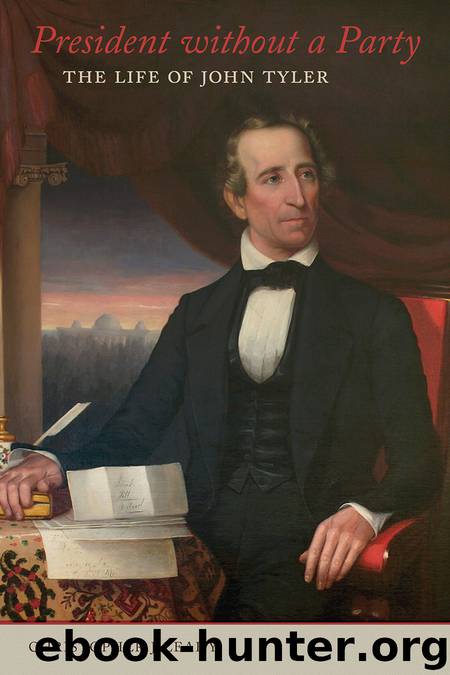President without a Party by Christopher J. Leahy

Author:Christopher J. Leahy
Language: eng
Format: epub
Publisher: LSU Press
Published: 2020-05-14T16:00:00+00:00
Chapter 14
AGGRESSIVE FOREIGN POLICY
Shortly after midnight on Monday, October 25, 1841, an American merchant brig, the Creole, slipped out of port at Hampton Roads, Virginia, en route to New Orleans. On board were ten crew members, seven passengers, several hogsheads of tobacco, and 135 slaves.
Voyages like this traveled down the Atlantic coast all the time. In fact, the Virginia–New Orleans water route had become a nexus of the interstate slave trade, bringing bondsmen and women who had been sold from the Upper South to the Gulf South. The trip typically took nineteen days. Though the duration of the journey could try the patience and will of the crew and passengers, to say nothing of what the enslaved people themselves had to endure, nobody on board the Creole had any reason to believe anything out of the ordinary was in the offing.
What happened on November 7, however, made it clear that the ship’s voyage would be anything but ordinary. Shortly after nine o’clock that night, a slave named Madison Washington led an insurrection that resulted in the stabbing death of a passenger, one of the slaveholders. Four crewmembers were wounded in the fracas. The rebellious slaves—nineteen in all—commandeered the ship and forced a white sailor to navigate toward the Bahamas, a British possession. The Creole arrived at the port of Nassau on the morning of the ninth.1
Washington and the other slaves had chosen the Bahamas as their destination because they believed they would be freed per the British Emancipation Act of 1833. British officials in the Bahamas obliged them by emancipating the slaves who had not taken part in the mutiny and refusing to extradite those who had participated to the United States, where they would stand trial for mutiny and murder.2
The report of the incident tempered the happiness Tyler had felt upon learning of Alexander McLeod’s acquittal in mid-October 1841. McLeod, the Canadian who stood trial for murder in New York State and who had allegedly been involved in the destruction of the American ship Caroline, had faced possible execution if found guilty. The jury’s verdict had relieved some of the strain in US-British relations. Outrage in the United States over the Creole, however, reignited the tension. Southerners demanded compensation for the owners of the newly freed slaves and argued that British actions in the wake of the mutiny affronted American honor. Many pointed to the recently concluded Amistad case to bolster their argument. In that instance, rebelling slaves had been freed without compensation because their Spanish captors had illegally detained them in violation of Spain’s 1820 statute outlawing the African slave trade. The illegality of the Amistad’s voyage meant that the slaveowners were not entitled to compensation. The Creole, on the other hand, had been legally engaged in America’s domestic, or interstate, slave trade, so most southerners believed that the slaveholders who lost their property in Nassau were entitled to compensation from the British government.
This was part of the argument that Secretary of State Webster—and thus the Tyler administration—made to the British government, which was relayed through the US minister to London, Edward Everett.
Download
This site does not store any files on its server. We only index and link to content provided by other sites. Please contact the content providers to delete copyright contents if any and email us, we'll remove relevant links or contents immediately.
| American Revolution | Civil War |
| US Presidents |
Fanny Burney by Claire Harman(25784)
Empire of the Sikhs by Patwant Singh(22172)
Out of India by Michael Foss(16312)
Leonardo da Vinci by Walter Isaacson(11901)
Small Great Things by Jodi Picoult(6093)
The Six Wives Of Henry VIII (WOMEN IN HISTORY) by Fraser Antonia(4790)
The Wind in My Hair by Masih Alinejad(4424)
The Lonely City by Olivia Laing(4120)
The Crown by Robert Lacey(4105)
A Higher Loyalty: Truth, Lies, and Leadership by James Comey(4032)
The Iron Duke by The Iron Duke(3639)
Millionaire: The Philanderer, Gambler, and Duelist Who Invented Modern Finance by Janet Gleeson(3568)
Sticky Fingers by Joe Hagan(3454)
Alive: The Story of the Andes Survivors by Piers Paul Read(3310)
Papillon (English) by Henri Charrière(3269)
Joan of Arc by Mary Gordon(3257)
Stalin by Stephen Kotkin(3084)
Aleister Crowley: The Biography by Tobias Churton(3019)
Ants Among Elephants by Sujatha Gidla(2924)
